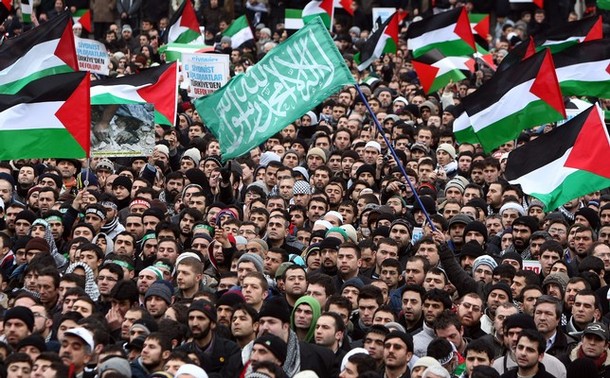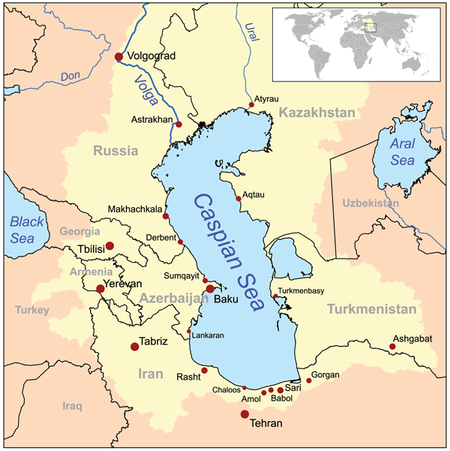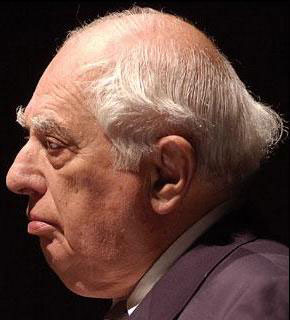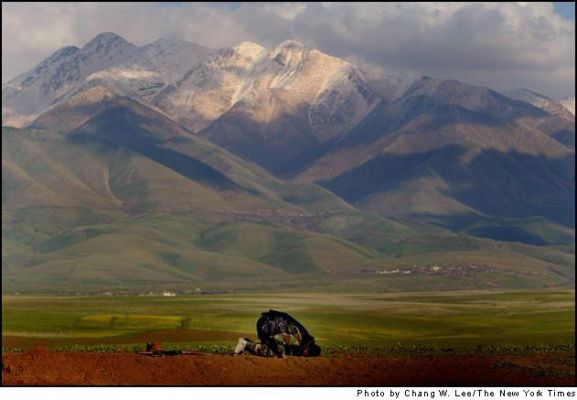"For too long, many nations, including my own, tolerated, even excused, oppression in the Middle East in the name of stability. Oppression became common, but stability never arrived. We must take a different approach. We must help the reformers of the Middle East as they work for freedom, and strive to build a community of peaceful, democratic nations." George W. Bush, Speech to UN General Assembly, September 21, 2004
David Seaton's News Links
Bush was actually right when he said that democracy would change the Muslim world, he just muffed the details a bit.
I'm surprised that the son of the only president of the USA to have ever headed the CIA could have been so naive about how American foreign policy actually works. I guess this was just another one of Dubya's many oedipal issues.
I'm in the midst of reading a very interesting book that came into my hands; "For the President's Eyes Only: Secret Intelligence and the American Presidency from Washington to Bush (Dad)", from way back in 1996, written by British historian, Christopher Andrew. It contains the following priceless quote, "The most powerful government ever to fall as a result of covert action was the administration of Richard Nixon." Not for want of trying all around the world, he might have added, (he does actually and in great and fascinating detail).
During the Cold War military dictatorships that were convincingly anticommunist, like Franco's in Spain, had a blank check from the USA to repress their populations and regimes that voted the way they weren't supposed to, like Chile, or looked like moving to the left, like Indonesia, got military dictatorships in short order: the list of these countries is very long. Summing up, the USA has a long and varied tradition of supporting military establishments in repressing any democratic, civilian dissent, if it didn't jibe with what Washington perceived as US interests.
This is part of what is extraordinary about Erdogan moving as far as he has, at the same time confronting Israel over Gaza, and, with Brazil (another Cold War, ex-military dictatorship), voting against US sponsored Iran sanctions in the UN, he is also apparently being allowed to bring the Turkish armed forces, which have always been seen in Washington as the guarantor of Turkey's modern (read pro-American and pro-Israeli) foreign policy under civilian control.
In short. the United States has always supported the Turkish army's ultimate control of Turkish life and now the generals are being hung out to dry.
Now, it must be said that the Turkish army has in no way hindered Turkey's modernization, quite the contrary. That has never been the issue. The Turkish army has been the guardians of the legacy of modern Turkey's founder, Mustafa Kemal Atatürk, a secular nationalist bent on turning Turkey into a modern European country, despite the continuing traditionalist piety of Turkey's masses. The irony is that the culminating of Atatürk's ambition of European-ization, joining the European Union, is helping an Islamist-traditionalist political party to disassemble the Kemalist, pro-western, power structure.
In short. the United States has always supported the Turkish army's ultimate control of Turkish life and now the generals are being hung out to dry.
Now, it must be said that the Turkish army has in no way hindered Turkey's modernization, quite the contrary. That has never been the issue. The Turkish army has been the guardians of the legacy of modern Turkey's founder, Mustafa Kemal Atatürk, a secular nationalist bent on turning Turkey into a modern European country, despite the continuing traditionalist piety of Turkey's masses. The irony is that the culminating of Atatürk's ambition of European-ization, joining the European Union, is helping an Islamist-traditionalist political party to disassemble the Kemalist, pro-western, power structure.
Here is a little light reading on Erdogan's referendum:
The referendum result is a triumph for Erdogan's ideology. It's hard to imagine the heads of Turkey's army plotting another coup, given that the reforms now allow them to be tried in civilian court, or the country's high court banning certain political parties as it has in the past.(...) Erdogan will remain hated by the Turkish secular elite, which is concentrated in the army, universities and business community. But he is beloved by Turkey's poorer, devout periphery. The prime minister has straightened the backbone of the marginalized, and in return has received their undying loyalty. HaaretzIn a largely Muslim country that sits at the crossroads of East and West, Turks who treasure secular rule are again warning about a “creeping coup” of political Islam. (...) In truth, the constitutional changes conform to democratic norms. They strengthen individual rights, privacy, and unions. They bring the military – which ousted four governments in the last 50 years – further under civilian control. But the abstract truth is not the same as the political reality in Turkey. The reality is that this is a polarized country, with a large segment of the population increasingly mistrusting of the government. Editorial - Christian Science Monitor
Logically one could suppose that, either the American leopard has changed its spots, has had a massive change of heart and has become willing to let the democratic chips of the world fall where they may, or that perhaps, the US feet are slipping off the pedals of the world's bicycle... (How's that for assaulting and battering a couple of helpless metaphors?).
Now, as important a client as the Turkish army is, there are much more important ones, if money is the measure. Of course, it goes without saying that Israel is the number one recipient of America's military aid, but number two is Egypt and according to the New York Times, Egypt's military consider Israel their "primary threat". Now it would seem obvious to me that the US has not given the Egyptian armed forces some $40 billion dollars over thirty years just to protect them from the Israelis, when it could have been done much more cheaply by simply giving less money to the Israelis. So it stands to reason that the Egyptian armed forces are receiving the money in order to make it easier for them to control Egypt. Here is how it all works:
(T)he rules that apply to the rest of Egypt do not apply to the military, still the single most powerful institution in an autocratic state facing its toughest test in decades, an imminent presidential succession.(...)Technically, Egyptian voters will determine their next leader in the 2011 elections, but in practice the governing party’s candidate is almost certain to win. The real succession struggle will take place behind closed doors, and that is where the military would try to assure its continued status or even try to block Mr. Mubarak’s son Gamal.(...) The military has much to lose in the transition, these officers and analysts say. Over the years, one-man rule eviscerated Egypt’s civilian institutions, creating a vacuum at the highest levels of government that the military willingly filled. “There aren’t any civilian institutions to fall back on,” said Michael Hanna, a fellow at the Century Foundation who has written about the Egyptian military.(...) The beneficiary of nearly $40 billion in American aid over the last 30 years, the Egyptian military has turned into a behemoth that controls not only security and a burgeoning defense industry, but has also branched into civilian businesses like road and housing construction, consumer goods and resort management. New York Times
Egypt, like Turkey, is a large and important country. Culturally Egypt is by far the most important Arab state and significantly, the Muslim Brotherhood has its origins there. Quite a few knowledgeable observers think that, if free and fair elections were ever held in Egypt the Brotherhood would win them. That would explain this further snippet from the New York Times:
The military interprets its writ broadly. A retired army general, Hosam Sowilam, recently said the army would step in “with force if necessary” to stop the Muslim Brotherhood, an Islamist group, from ascending to power.
In fact elections are to be held in Egypt next year, because the ancient dictator, Hosni Mubarak, is ailing, but it would be a miracle if the coming elections turned out to be "free and fair".
(Nobel Laureate and) Former UN nuclear weapons chief and prominent Egyptian dissident Mohamed ElBaradei (...) warned that the (Egyptian) poll would be marred by fraud, and that "anyone who participates in the vote either as a candidate or a voter goes against the national will". He went on to claim that the three-decade rule of president Hosni Mubarak was a "decaying, nearly collapsing temple", and promised activists that regime change was possible in the coming year. Guardian
Sufficient to say that if a process similar to Turkey's were to take place in Egypt -- and although it is a vastly different country from Turkey, the human resources exist in Egypt to make it happen -- all bets would be off in the Middle East.
I have no idea what form a free and democratic Egyptian government would take, only that a country of the size and cultural power of Egypt following the desires of its people would change the entire region in days.
It will be interesting to hear Secretary of State Clinton's comments on Turkey and even more interesting to hear her comments on Egypt and its democratic process... if she makes any. DS









Precisely at the moment that the Turkish army is about to invade Iraqi Kurdistan and terminally destabilize whatever might be left of Iraq, the Senate passes this "Armenian genocide" resolution. This could literally put in jeopordy the lives of thousands of American soldiers... (not to speak of millions of Iraqis).
Between the Jewish, Cuban and now the Armenian (???), lobbies, any idea of a coherent US Foreign policy is literally collapsing. Any American pretense at world leadership dissolves in this endless nonsense. Quelle bordelle! DS
Armenian sway over US lawmakers - BBC
Abstract: Despite a direct appeal by US President George W Bush, lawmakers in the US have backed a description of the mass killings of Armenians by Ottoman Turks after 1915 as genocide. While Armenia welcomed the vote by a panel in the US House of Representatives, Turkey condemned it as "unacceptable" and has recalled its ambassador to Washington for "consultations". (...) Ahead of the vote, senior administration officials warned that if the resolution passed, Turkey could cut access to military bases needed for US operations in Iraq and Afghanistan. Its passage "would do great harm to our relations with a key ally in Nato and in the global war on terror", Mr Bush said from the White House Rose Garden. Nonetheless, the non-binding resolution passed the House Foreign Affairs Committee by 27 to 21, a first step towards holding a full vote in the House of Representatives. Given that Armenians represent only about 1.5m of America's 300m population, what has won them such influence over the US Congress - and perhaps the nation's foreign policy? Part of the answer lies in the organisation and determination of the Armenian-American lobby groups, says Dr Svante Cornell, of the Central Asia-Caucasus Institute at Johns Hopkins University. The Armenian National Committee of America (ANCA) and the Armenian Assembly of America (AAA) are among the most powerful. Another factor is that the Armenian-American community is largely concentrated in important states such as California, Michigan and Massachusetts, Dr Cornell said. "You have basically a number of places where the Armenian issue is very important in local politics - especially for anybody wanting to get elected in California," he said. "The Turkish lobby is much less organised and much less rooted in an electorate than the Armenian lobby." READ IT ALL